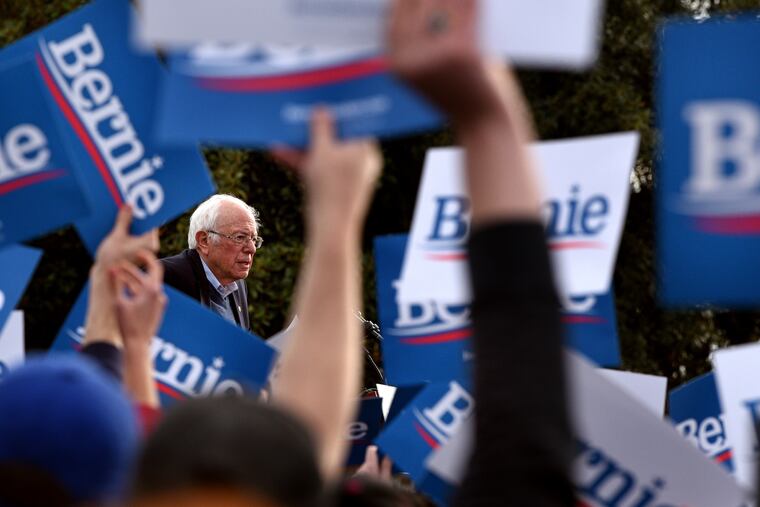Bernie Sanders ends his presidential campaign, clearing the way for Joe Biden
He moved the Democratic Party left but turned out to be a little too radical for many of the party's primary voters.

Vermont Sen. Bernie Sanders ended his presidential campaign Wednesday, the finale of a roller coaster Democratic primary campaign in which he overcame a heart attack, became the clear front-runner in early states, and then faltered as former Vice President Joe Biden surged.
Sanders, a registered independent and a democratic socialist who built a movement during his 2016 run, will now look to continue to push the party’s agenda to the left as the national focus has shifted from politics to the devastating virus overtaking the world.
His decision means that Biden, in his third attempt at the White House, is all but assured of being the Democratic nominee against President Donald Trump, though he won’t officially hit the number of delegates needed until at least June 2, when several states, including Pennsylvania, are holding primaries.
There was no realistic path to victory, Sanders told supporters in a speech livestreamed from his Burlington, Vt., home. “I cannot in good conscience continue to mount a campaign that cannot win and which would interfere in the important work required of all of us in this difficult hour," he said.
The end came after a string of losses to Biden and as the coronavirus ended normal campaigning.
Pennsylvania’s primary, which was postponed from April, now will have no real role in deciding the nomination, and neither will New Jersey’s, moved from June 2 until July 7.
Biden, in a statement Wednesday, praised Sanders for creating something bigger than a political campaign. "Make no mistake about it, I believe it’s a movement that is as powerful today as it was yesterday,” the vice president said.
In a Democratic campaign once more than a dozen people strong, Sanders was the most liberal candidate in the field, pushing Medicare for All, free college tuition, and other policies that some voters — and party leaders — felt went too far. Yet those ideas and his reputation for consistency energized others.
His drive also had the most robust grassroots fund-raising operation in modern campaign history, raising millions each quarter in small-dollar donations. In the last few weeks, he’d started raising money for organizations helping with the coronavirus crisis.
But Sanders has acknowledged that while he polled best with young people, they didn’t turn out enough for him to win in key states where his campaign invested. Sanders also lost in more rural parts of states like Oklahoma and Michigan, where he had beat Hillary Clinton in 2016. And as Biden started to gain momentum after a big win in South Carolina, it was Biden driving high turnout, exit polling showed.
Some Democrats, especially older ones, saw Sanders’ ideas as too extreme, and feared they would cost the party states like Pennsylvania. Sanders turned off many moderate suburban voters who have revolted against Trump and become a driving force in the Democratic coalition.
While Biden voters typically say they trust him or feel comfortable with him, and view him as the safest choice against Trump, Sanders supporters express fervent devotion. Many see the Vermont senator as more than a candidate. They see the founder of a movement that speaks for people who have been ignored, one they didn’t want to see silenced again.
Sanders supporters were frequently driven by specific issues — health care, climate change, and student debt among them — that they argued were so urgent as to require revolutionary change. Yet, polls showed most Democrats believed beating Trump was more important than any one issue.
Philadelphia Councilmember Helen Gym, one of the few elected officials to endorse Sanders, said his followers had camaraderie and a sense of mission.
“His belief that slogans like ‘Not me, us,’ or ‘Fight for someone you don’t know,’ is more than just a hashtag,” Gym said. "It’s really about a form of politics that is going to be needed more than ever in this crisis that we’re living through right now.”
Now the question for Democrats is whether the party can unite as it failed to do in 2016, when bitterness between supporters of Sanders and nominee Clinton hurt the party’s drive to win the presidency.
In his statement, Biden reached out to Sanders supporters: “I see you, I hear you, and I understand the urgency of what it is we have to get done in this country."
For a brief time, Sanders was the front-runner. But the senator who steadfastly refused to modify his message could not expand his coalition, and that proved devastating.
Biden dominated the fourth primary contest, in South Carolina, with landslide support from African Americans, a key group in the Democratic coalition and one that Sanders struggled to win over. At that point, Biden’s centrist rivals dropped out and the vast majority of Democrats coalesced around him. He won 10 of 14 states voting on Super Tuesday March 3, though he hadn’t visited or even advertised in some.
Sanders said he would stay on the ballot in the remaining primary states in hope of gathering enough delegates to shape the party platform at the convention, now moved from July to August.
In addition to helping defeat Trump, the Vermont senator said, he and his supporters will "fight to elect strong progressives at every level of government, from Congress to the school board.” He called Biden a “very decent man.”
Staff writer Jonathan Tamari contributed to this article.